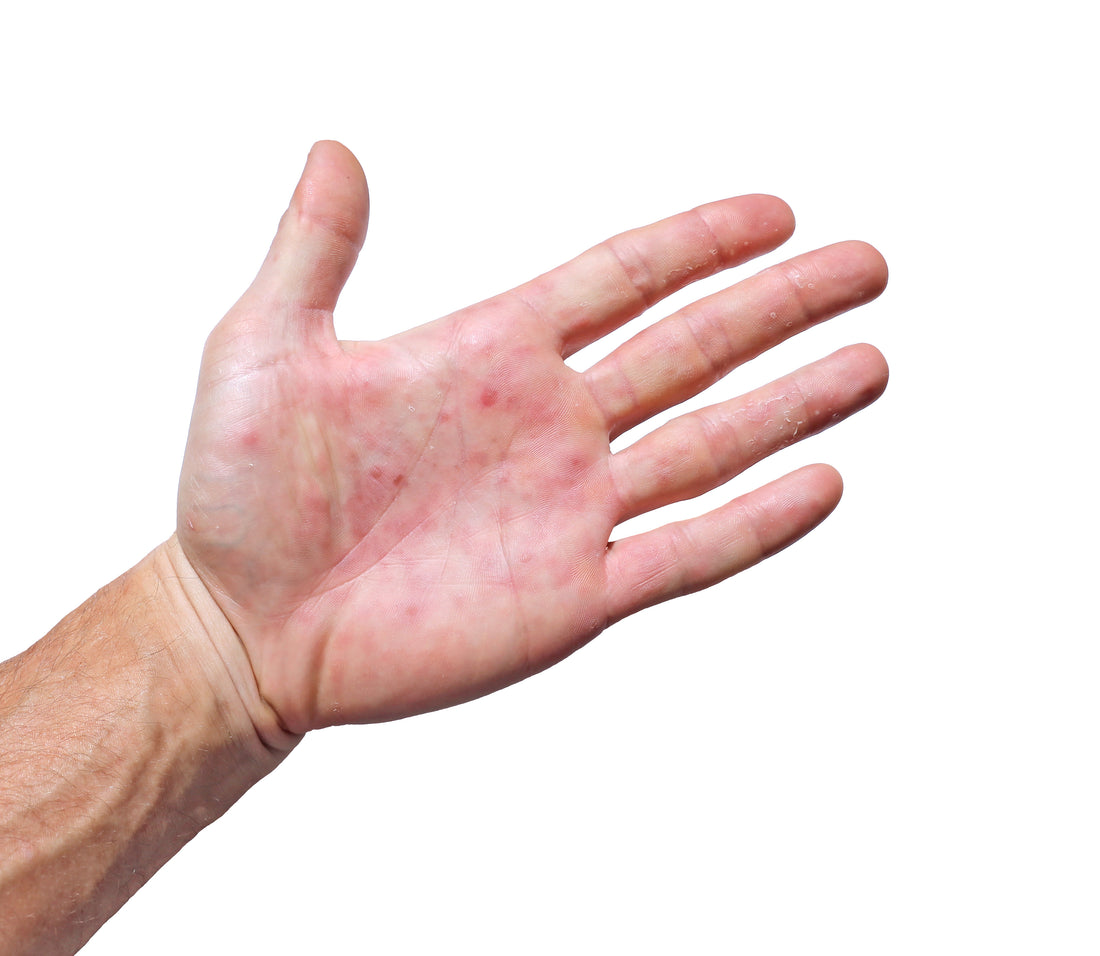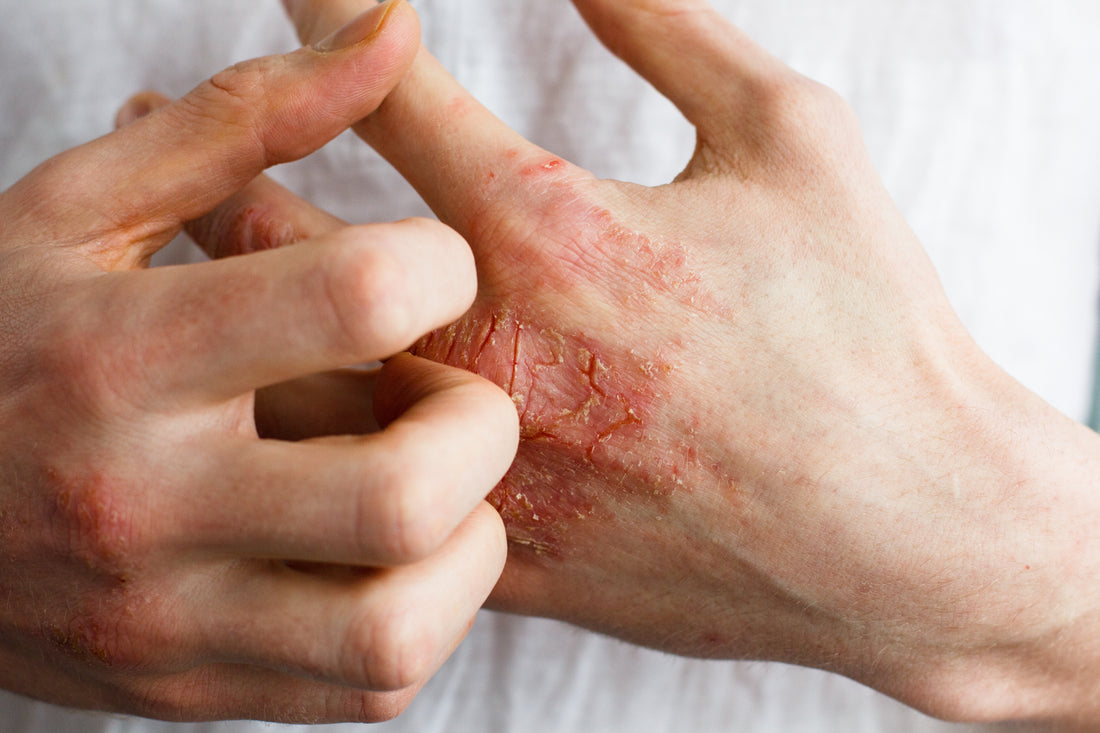The link between school, stress and eczema is nothing new to those who have the condition. And that’s no small number! On average, six children in a class of 30 experience eczema.
Maybe exam stress triggers your child’s symptoms. Or perhaps flare-ups make them stressed, both through worries about standing out and the distraction of pain and itching. Maybe it’s all of this, and more besides!
As the new academic year begins, carers of children with eczema might have concerns about the school-stress-eczema connection. If you’re wondering how to support your little one or young person in managing stress-related eczema, we’re here to help.
Knowledge is power, so we’ve put together a guide to reducing school stress and the flare-ups it can cause. Let’s start at the beginning!
Can stress cause eczema?
A question we often hear is ‘does stress cause eczema?’ and the short answer is no. The ultimate cause of eczema is unknown, but the consensus is that stress doesn’t in and of itself cause dermatitis (another name for eczema).
However, if the question is ‘can stress cause eczema to flare?’ the answer is absolutely. It’s well known that stress can trigger ‘flare-ups’ or ‘outbreaks’ (episodes of eczema), and can also worsen existing symptoms.

Why does stress cause eczema to flare up?
Researchers continue to explore just how stress, quite literally, ‘gets under our skin’. Meanwhile, studies already point to a number of ways. Stress:
1. Inhibits the skin’s barrier function. This can increase sensitivity to allergens and reduce skin’s hydration. It can also lower our threshold for itch, making scratching much harder to resist. How it triggers eczema: All three are factors that can cause eczema outbreaks.
2. Increases stress hormones, such as cortisol, in the body. Since high levels of cortisol for repeated or long periods can suppress the immune system (bear in mind the skin is our largest immune organ!), this can lead to inflammation. How it triggers eczema: Inflammation is a known risk factor for dermatitis flare-ups.
3. Makes it tough for the skin to repair itself after irritation, because sustained changes to stress hormone levels impact skin recovery. How it triggers eczema: This could explain why a little flare becomes a big flare very quickly when stress is involved!
These are just some of the ways the stress-response and eczema are connected. Unfortunately, a stress-induced eczema outbreak often leads to more stress, and so the two are linked in a vicious cycle.
What types of eczema are linked to stress?
There are many types of eczema, the most common being atopic dermatitis. Atopic eczema runs in families and is linked with likelihood of developing asthma, hay fever and eczema. Other types include:
- contact dermatitis, which develops when allergens or irritants touch the skin;
- nummular eczema (also known as discoid dermatitis), which forms round or oval patches;
- pompholyx eczema (also known as dyshidrotic eczema), which starts with a burning sensation followed by a sudden dermatitis blister rash on hands and feet.
There are other forms, and we can also refer to eczema by the part of the body it affects (such as ‘facial eczema’). Regardless of the type, stress can exacerbate eczema symptoms - you could see stress-related eczema on hands, for example. Stress is especially associated with triggering flare-ups of atopic, nummular and pompholyx eczema.

Other eczema triggers
You probably know that stress isn’t the only thing that can cause dermatitis to flare up. Triggers can be anything that activate the immune system, causing additional inflammation and making skin cells change their behaviour.
Here are some other potential eczema breakout causes, and how to help your child avoid them during term-time.
Allergens
Eczema and allergies go hand-in-hand, and allergic reactions can quickly cause skin flare-ups.
Top tips: Sadly, school can’t protect your child from every allergen. An obvious example is pollen – with the best will in the world, no one can prevent those microscopic allergy-causers from circulating in the air! However, you can make school aware of any known allergies so that they can do their best to keep your child away from contact with their personal eczema triggers.
Additionally, if your child has a food allergy, packed-lunches are a great idea for avoiding possible allergen-based triggers in school meals.
Chemicals
People with dermatitis are often more sensitive to certain chemicals, especially when their skin is already inflamed.
Top tips: Hypoallergenic laundry detergents are a great choice for washing your little one’s school uniform. You could also consider sending your child in with a sensitive cleanser for use in place of the school hand soap, too. It’s always a good idea to keep a note of the ingredients of any products that cause eczema flare-ups for your child – you may be able to pinpoint chemicals to avoid.
School stress
By school stress, we mean anything at or related to school that causes a pupil to feel worried, overwhelmed or threatened. Sometimes, a young person might not be conscious of experiencing this type of stress, yet their body reacts to it nonetheless.
Here are some common causes of school stress that could trigger eczema:
Bullying and friendships
Friendship issues and bullying are a significant cause of stress in children. Whether verbal, physical and online – all forms of bullying are damaging to the sufferer’s self-esteem and mental health. For those with eczema, the stress of being bullied might be the initial trigger for a flare-up. On the other hand, bullying might be a direct result of their dermatitis.
According to the National Eczema Society, one in five mums of kids with eczema said their little ones have been bullied at school because of their condition.
Three quarters of those said the bullying had affected their child’s self-esteem.
Clearly, bullying is a serious problem and should be addressed, not only for the sake of preventing flare-ups. Brilliant guides to handling bullying such as this can give you the tools to support your child. The National Eczema Society’s school guide also has advice for both parents and schools on fostering a positive climate to prevent this issue.
Exams and assessment
We all know the pressure of assessments can take its toll, and this type of stress seems to be on the rise: The number of school children calling Childline about exam stress doubled from 2020 to 2021.
Depending on your young person’s age, helping them to make a reasonable revision schedule and to set realistic goals can help. While they can’t avoid exams altogether, there are ways to handle the mental load. Speak to the school for tested strategies.
Concentration
Eczema can demand children’s attention. The distraction of itching and pain, plus time spent applying creams and thinking about avoiding a flare-up can all have knock-on effects on concentration in school. In turn, fears around falling behind and drawing attention can cause stress, which can – you’ve guessed it – trigger an outbreak.
Supporting your young person at home with their homework and catching up can help manage this stressor. Additionally, touching base with teaching staff is always good. You can regularly check-in on how eczema is affecting your child’s school work, ensure they’re getting robust support and ask that allowances are made when symptoms pique.

Symptoms of school stress
Other than skin flare-ups, there are tell-tale signs that can indicate a child is experiencing school stress. These can include:
- Irritability;
- Headaches and tummy aches;
- Issues with sleep.
If you recognise these signs and suspect they’re related to stress, you might just be able to intervene before a flare-up takes hold. Read on for some ideas!
Reducing school-stress related eczema
It sounds simple - preventing school stress related eczema should be as easy as reducing school stress, right? However, anyone with a burdened young person knows their stress isn’t always something you can control.
We’ve given some ideas for handling specific school stressors above, and we’ll cover some more general strategies below, too. However, whether stress-related or not, your child might still have a flare-up during term time, and that’s okay! There areways to prevent a small flare from intensifying, so we’ll also look at how to manage eczema outbreaks at school.
Strategies for coping with school stress
Organise!
It might sound obvious, but organisation can keep feelings of overwhelm in check and reduce overall stress levels. You can help by ensuring your young person has the stationery they need, a time table pinned up at home and – depending on their age – a study schedule. Keeping a regular rhythm for meal times, bedtimes and study times helps, too.
The right study environment
A calm and soothing environment can help your young person chill out and help them learn. For those with eczema, the surroundings are even more important. For example, heat and dryness could trigger their symptoms, so a desk next to a radiator is a no-no! Speaking to school about the right space for them in class could help make them more comfortable and reduce their stress.
Exercise
A known stress-buster, exercise releases feel-good endorphins and makes us feel good. Finding an exercise your child enjoys can be a great way to help them manage school stress, whether as part of an organised sports or exercise club or informally. Just remember to ensure they have a lukewarm bath or shower after sweating to prevent irritation.
Relaxation and meditation techniques
Even the youngest children can benefit from learning some relaxation techniques (try the Zen Den on YouTube for little ones!). Older kids with access to their own devices could use a meditation app.
Support
Spending time with family and supportive friends can help release those feelings of school-related tension. Simply knowing you’re there to talk through worries can make all the difference.
Fun!
Doing something we enjoy is a great way to take our mind off stress. Create opportunities for your young person to do something that makes them feel good, whether that’s going to the movies, reading a book or playing games with you!
Sleep
Sleep can be tricky for people with eczema, but getting into a routine to try and ensure a good night’s kip is really beneficial for overall wellbeing.
Managing flare-ups
Eczema treatments can vary depending on what type of eczema your child has and how severe it is. Your child’s doctor will diagnose your young person’s condition and propose a suitable treatment regimen. This might include emollients, steroid creams, antihistamines and antibiotics (if a flare-up develops into a bacterial infection). Always discuss your child’s treatment plan with their school.
Whether symptoms of eczema are caused by stress at school or by something else, itching can strike anytime – including in the classroom.
When your child’s skin begins to itch, scratching is a sure-fire way to intensify symptoms. It can break the skin, causing inflammation, soreness and more itchiness! Sometimes, scratching introduces infection.
Strategies that help manage itchiness at home, such as wet-wrapping and baths, might not be possible at school. But as anyone with experience of eczema knows, expecting a child not to scratch when they desperately need relief is just not realistic. That’s why, at Cosi Care, we developed tools for safe scratching.
Safe scratching
The Cosi Care Scratch Star and Scratch Attack Roller are designed to ‘outmatch the scratch’. Through distracting sensations (texture and pressure) and cold (scientifically proven to calm itching), our safe scratchers provide instant relief when it’s most needed.
For use at school, pop your child’s safe scratcher straight from the fridge into an insulated lunchbox, along with their favourite moisturiser. Add a pack of unscented tissues to wipe up their star and/or roller after use! When itching strikes, they’ll be prepared to take control and soothe their skin. Simply add a blob of moisturiser to the itchy area (or to the inside of their roller) and gently massage with their safe scratcher. No fingernails needed!
We hope that knowing they have something to help manage itching at school will reassure your young person. And with that peace of mind, a little of the stress is taken away from dealing with eczema at school.
Find our unique safe scratching tools here. To find out more about Cosi Care, why not join our community? Chat to us on Facebook and Instagram or subscribe to our newsletter via the box below!
Sources
Scientific review of the effect of stress on skin.








